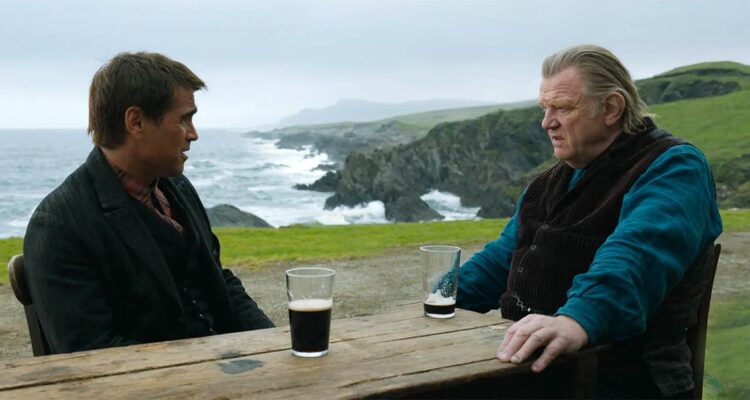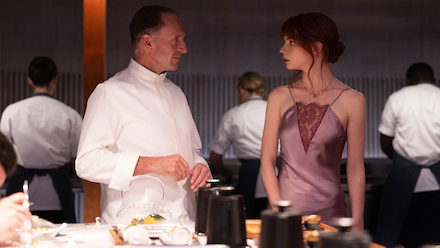 Haven’t we all taken a moment in our life to ponder “what if?”. What if you took that job; what if you pursued what made you happy; what if there was more to life than you’re getting out of it? These are deep, existential questions that can open old wounds or create new ones. They can make or break relationships.
Haven’t we all taken a moment in our life to ponder “what if?”. What if you took that job; what if you pursued what made you happy; what if there was more to life than you’re getting out of it? These are deep, existential questions that can open old wounds or create new ones. They can make or break relationships.
And, in the case of Colm Doherty (Brendan Gleeson), his time spent pondering life’s great questions has resulted in the breakdown of his relationship with his best friend, Pádraic Súilleabháin (Colin Farrell). It’s the talk of the island where the pair live. Colm has decided that he wants to use his remaining years to pursue his love of music – to leave a legacy behind. Pádraic cannot understand his change of heart, and his desperate attempts to win back his only friend have drastic consequences for the pair.
What’s clear from the offset is that this film is no howling banshee. Instead, it’s a quiet portrait of dealing with loss and hopelessness. There is plenty of situational humour and lots of free-flowing Irish patter throughout, but the power of the Banshees comes from its quieter, more reflective moments. The seemingly endless greenery of the island landscape – whilst beautiful to look at – seems to swallow the characters whole. There is no escape from the village gossip or the sideways glances. The mournful laments that score the film emphasise the listlessness that so many of the characters feel.
McDonagh weaves several different “what ifs” into the film, giving each of the main characters the chance to really tell their story. Yes, this is a story that, on the surface, is about the breakdown of a friendship, but there is so much more to it than that. The incredibly strong performances from Gleeson and Farrell, as well as Kerry Condon and Barry Keoghan elevate this film to something that will really touch your core.
Gleeson’s character is clearly dealing with his own mortality, as he becomes obsessed with writing a piece of music that will ensure his name is remembered in the years to come. He thinks his friendship with Pádraic will be a distraction to achieving this greatness. But, really, we get a sense that it’s Pádraic’s youth and energy that is the problem: Colm suspects he hasn’t long to go and he wants to wallow in that. Sitting in the confessional booth, talking to the local priest about his sense of overall despair, he sighs, “Aye, it’s back a bit.” Gleeson is equal parts crotchety and endearing; sympathetic and frustrating. It’s a very nuanced character study that allows us to feel everything Colm is feeling.
 Colin Farrell, as Pádraic, provides a lighter touch than Gleeson and yet his despair is similarly palpable. Without his best friend, he is left to his meander around with his animals. It’s his desperate loneliness that fills the screen. He fears that he is dull or unkind or not smart upon losing his friend, and this frantic search to prove that he is none of these things is very relatable and heartbreaking. Farrell excels in quiet, dramatic roles like this and his natural chemistry with Gleeson plays out perfectly, here.
Colin Farrell, as Pádraic, provides a lighter touch than Gleeson and yet his despair is similarly palpable. Without his best friend, he is left to his meander around with his animals. It’s his desperate loneliness that fills the screen. He fears that he is dull or unkind or not smart upon losing his friend, and this frantic search to prove that he is none of these things is very relatable and heartbreaking. Farrell excels in quiet, dramatic roles like this and his natural chemistry with Gleeson plays out perfectly, here.
Barry Keoghan will leave you devastated as the cheeky but brutally naïve, Dominic, a young lad who is suffering at the hands of his abusive father. This is another scene stealing performance from Keoghan, who easily deserves an Oscar nod for this role. Kerry Condon, as Pádraic’s sister, Siobhan, is torn between pursuing her love of reading and staying with her brother. She makes clear the lack of options for unmarried women in 1920s Ireland, making her strength and courage in following her heart even more impactful.
The script is absolutely tremendous. The writing here is on an entirely different level to most other films you will watch this year. The humour is razor sharp; the grief and trauma of the more dramatic moments will leave you shocked and bruised. Original creative work like this is what makes people fall in love with cinema. There’s not a beat missed; not a moment left unseized. It is hard to compare to anything else because, despite the fact that it explores themes and questions that have been raised throughout cinema history, it feels so fresh and charming and compelling. The quiet close ups allow us to sympathise with everything the characters are going through; the sweeping landscapes allow us to feel every bit as lost as they are.
Martin McDonagh’s latest film is a study in despair and in “what ifs”. It’s a beautiful slow burn of decisions, desperation and consequences. With excellent performances from every cast member – no matter how large or small the role – The Banshees of Inisherin may well find itself topping several “best film” lists this year.
The Banshees of Inisherin is now screening at UK cinemas.
- Armand – Review - November 4, 2024
- Eephus – Review - November 3, 2024
- Windless – Review - November 2, 2024





One thought on “The Banshees of Inisherin – Review”